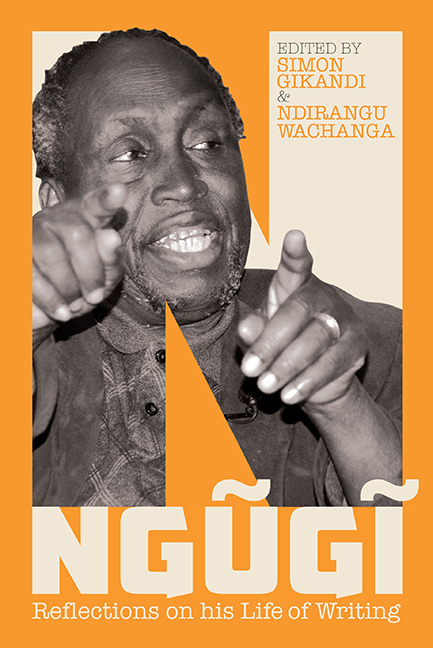Book contents
- Frontmatter
- Contents
- Preface
- Acknowledgements
- Chronology
- Photographic Section
- Introduction: Ngũgĩ wa Thiong'o: Reflections on His Life of Writing
- Ngũgĩ at Work
- Part I Serenades & Beginnings
- Part II Memories, Recollections & Tributes
- Part III Working with Ngũgĩ
- Part IV The Writer, the Critic & the World
- Part V The Other Ngũgĩ
- 31 Kwa Grant Kamenju: Hotuba ya Kuipokea Digrii ya Heshima ya Uzamifu Kutoka Chuo Kikuu cha Dar es Salaam
- 32 Wasomi, Lugha za Ulaya na za Kiafrika: Kati ya Kuweza na Kuwezwa
- 33 Asia in My Life
- 34 Ndaĩ ya Wendo (A Riddle of Love)
- Appendixes
- References
- Bibliography of Ngũgĩ's Primary Works
- Works Cited
- Notes on Contributors
- Index
33 - Asia in My Life
from Part V - The Other Ngũgĩ
Published online by Cambridge University Press: 27 July 2019
- Frontmatter
- Contents
- Preface
- Acknowledgements
- Chronology
- Photographic Section
- Introduction: Ngũgĩ wa Thiong'o: Reflections on His Life of Writing
- Ngũgĩ at Work
- Part I Serenades & Beginnings
- Part II Memories, Recollections & Tributes
- Part III Working with Ngũgĩ
- Part IV The Writer, the Critic & the World
- Part V The Other Ngũgĩ
- 31 Kwa Grant Kamenju: Hotuba ya Kuipokea Digrii ya Heshima ya Uzamifu Kutoka Chuo Kikuu cha Dar es Salaam
- 32 Wasomi, Lugha za Ulaya na za Kiafrika: Kati ya Kuweza na Kuwezwa
- 33 Asia in My Life
- 34 Ndaĩ ya Wendo (A Riddle of Love)
- Appendixes
- References
- Bibliography of Ngũgĩ's Primary Works
- Works Cited
- Notes on Contributors
- Index
Summary
The links between Asia and Africa and South America have always been present but in our times, they have been made invisible by the fact that Europe is still the central mediator of Afro-Asian-Latino discourse. We live under what Satya Mohanty in his interview in Frontline (April 2012), aptly calls the long intellectual shadow of the Age of European Empire.
In my case, I had always assumed that my intellectual and social formation was tied to England and Europe, with no meaningful connection to Asia and South America. There was a reason. I wrote in English. My literary heroes were English. Kenya being a British colony, I had learnt the geography and history of England as the central reference in my widening view of the world. Even our anti-colonial resistance assumed Europe as the point of contest; it was we, Africa, against them, Europe. I graduated from Makerere College in Uganda in 1964, with a degree in English; then went to the University of Leeds, England, for further studies, in English. Leeds was a meeting point of students from the Commonwealth: India, Pakistan, Australia, and the Caribbean. We saw each other through our experience of England. Our relationship to England, in admiration, resentment or both, was what established a shared space.
After I wrote my memoir of childhood, Dreams in a Time of War, published in 2006, I looked back and saw how much India had been an equally important thread in my life. I had not planned to bring out the Indian theme in my life: but there it was, staring at me right from the pages of my narrative. The thread starts from home, through school, college and after.
I did not grow up in a Christian home, but we celebrated Christmas, everybody did; it was a time of carnival, with children, in their very best, trooping from house to house to indulge their fancy in terms of food. We were vegetarians throughout the year, though not out of choice, and to many, Christmas day was the first time they would taste meat. For me Christmas meant the occasion for eating gĩtoero, a curried broth of potatoes, peas, beans, and occasionally a piece of lamb or chicken, but the centerpiece of the dishes was cabaci sometimes called mborota.
- Type
- Chapter
- Information
- NgugiReflections on his Life of Writing, pp. 194 - 199Publisher: Boydell & BrewerPrint publication year: 2018



